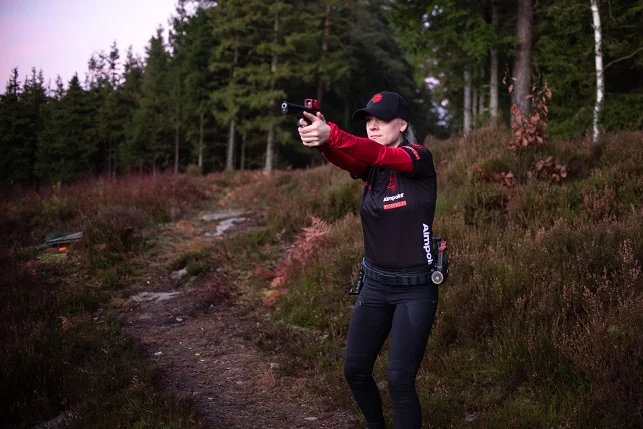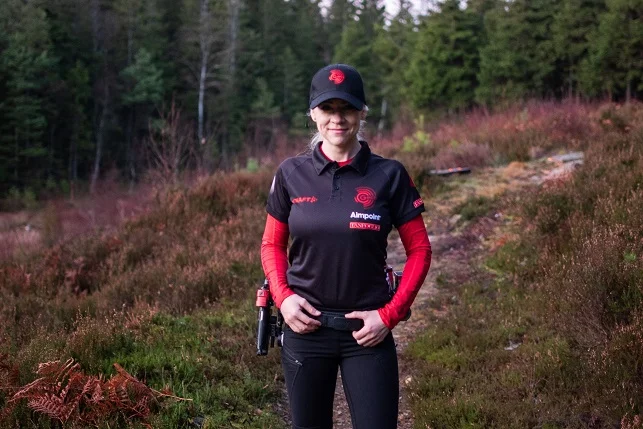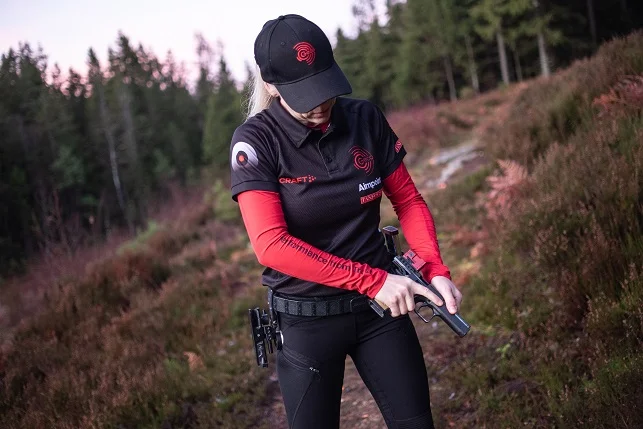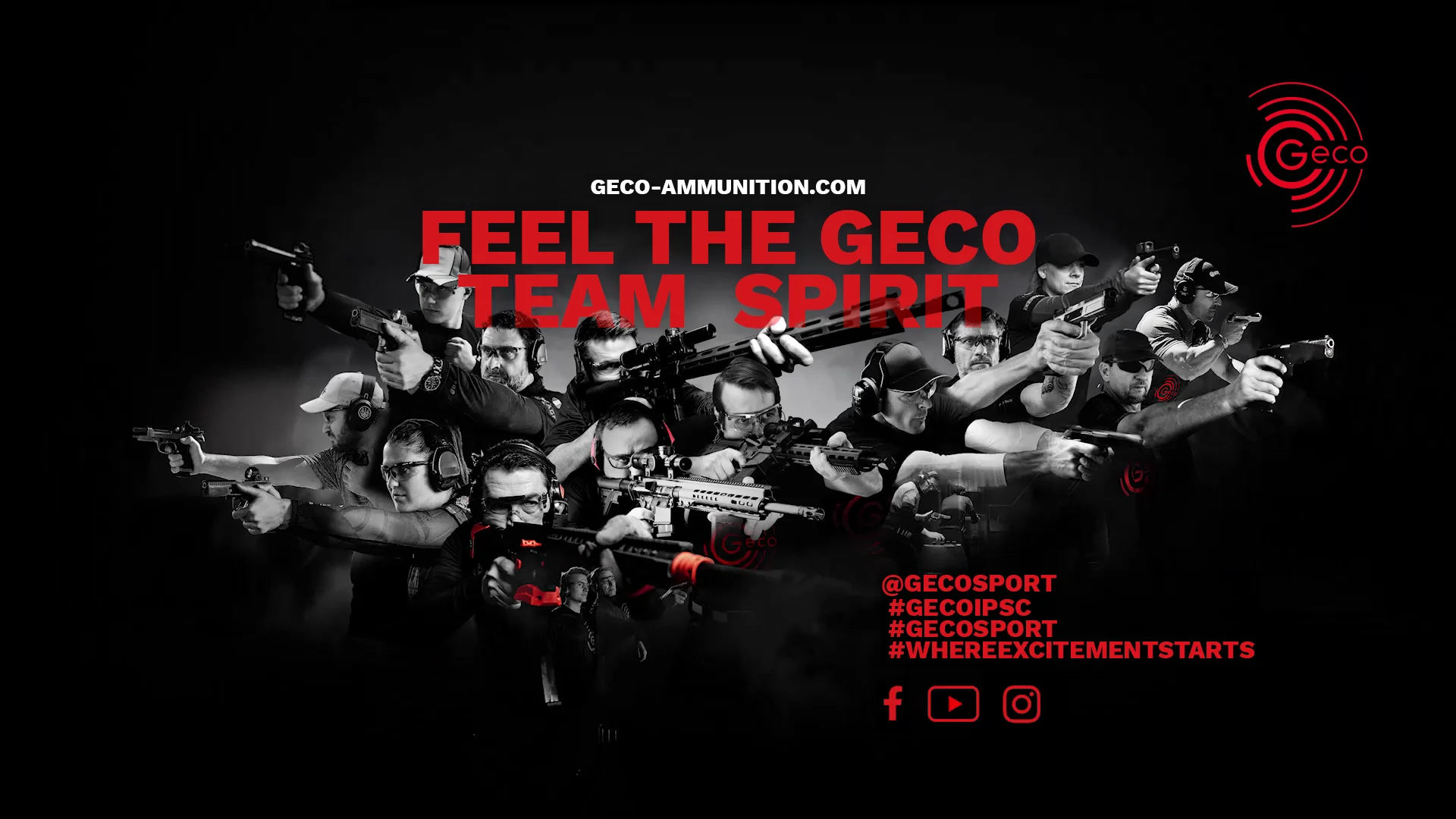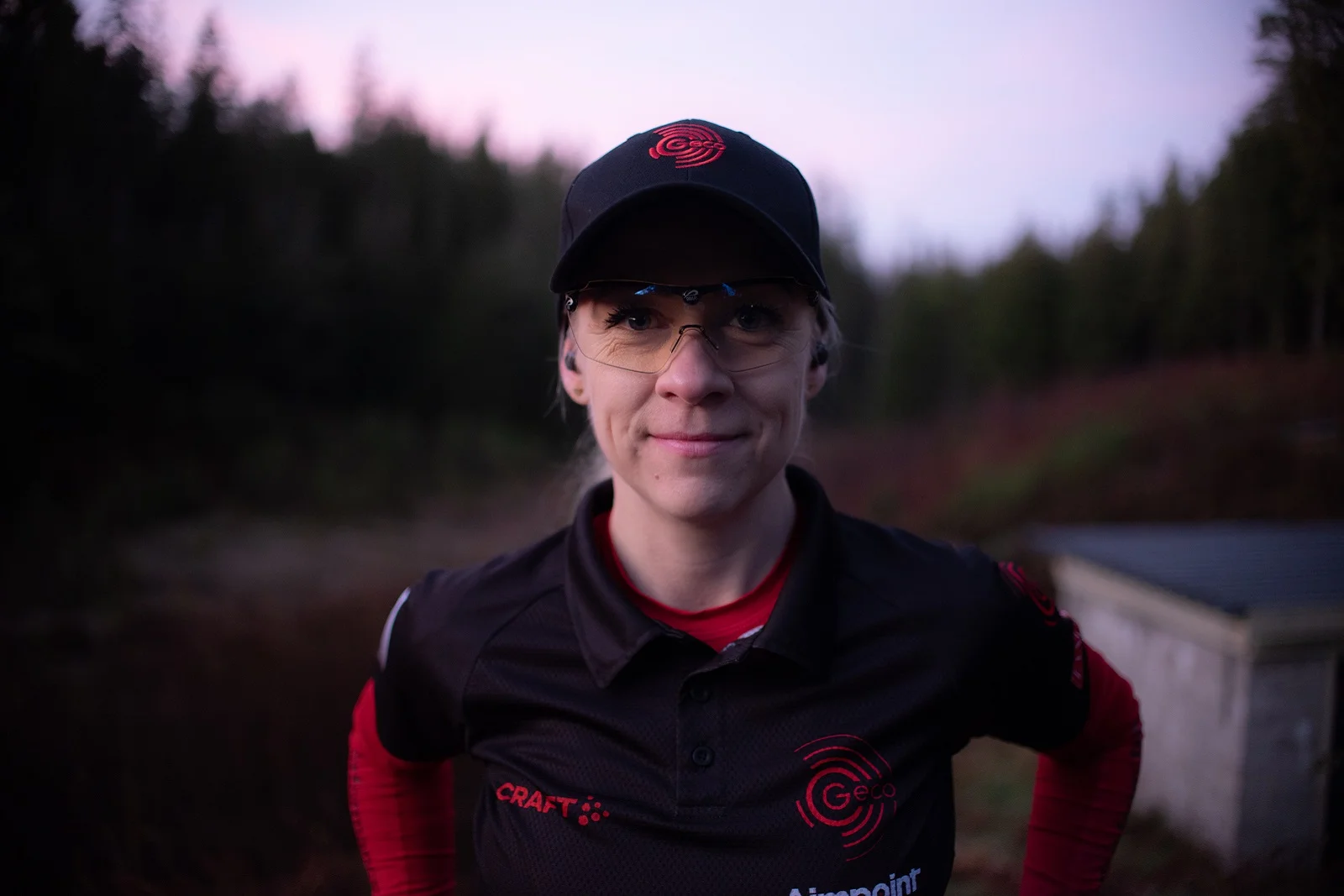
SHOOTING PORTRAIT:
Cecilia Lindberg
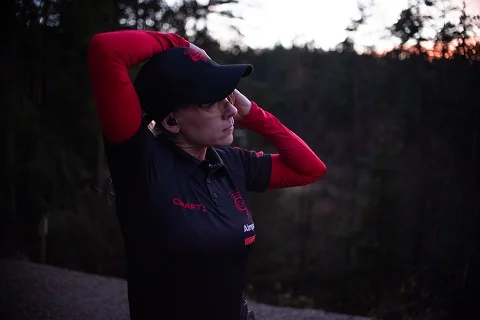
GECO IPSC Team Shooter
Cecilia Lindberg, Sweden
Cecilia Lindberg, a dedicated IPSC shooter from Sweden, has been actively competing in dynamic shooting since 2013. In 2022, she transitioned to the Production Optics Lady division, where she achieved significant success. Notably, she secured a bronze medal in the Lady Category at the 2022 IPSC Handgun World Shoot XIX in Pattaya, Thailand. Building on this momentum, Cecilia clinched the gold medal in the Production Optics Lady division at the 2023 IPSC European Handgun Championship in Greece. Her consistent dedication and performance have established her as a prominent figure in the IPSC community.
Shooting for IPSC Gold and Inspiring Women Along the Way
Growing up near Trollhättan, Sweden, Cecilia discovered her passion for shooting early on. Since 2013, she has been an active competitive shooter and now works as a trainer, focusing on women’s courses to inspire confidence and enthusiasm for the sport.
I had the absolute pleasure of growing up on a farm just outside the lovely little town of Trollhättan in Sweden. When I was 16, I started shooting some air rifles and also got my hunter's licence. At the police academy, I had my first ever go at shooting a pistol. From the very first shot, I fell in love with pistol shooting. Over the years, my passion for it has only grown stronger. In 2013, I shot my first match in dynamic shooting, and the rest, as they say, is history! For a number of years now, I've been working as a trainer, both privately and within the police. My main focus as a trainer privately has been to hold courses for only female participants, with the hope of inspiring, coaching and supporting women.
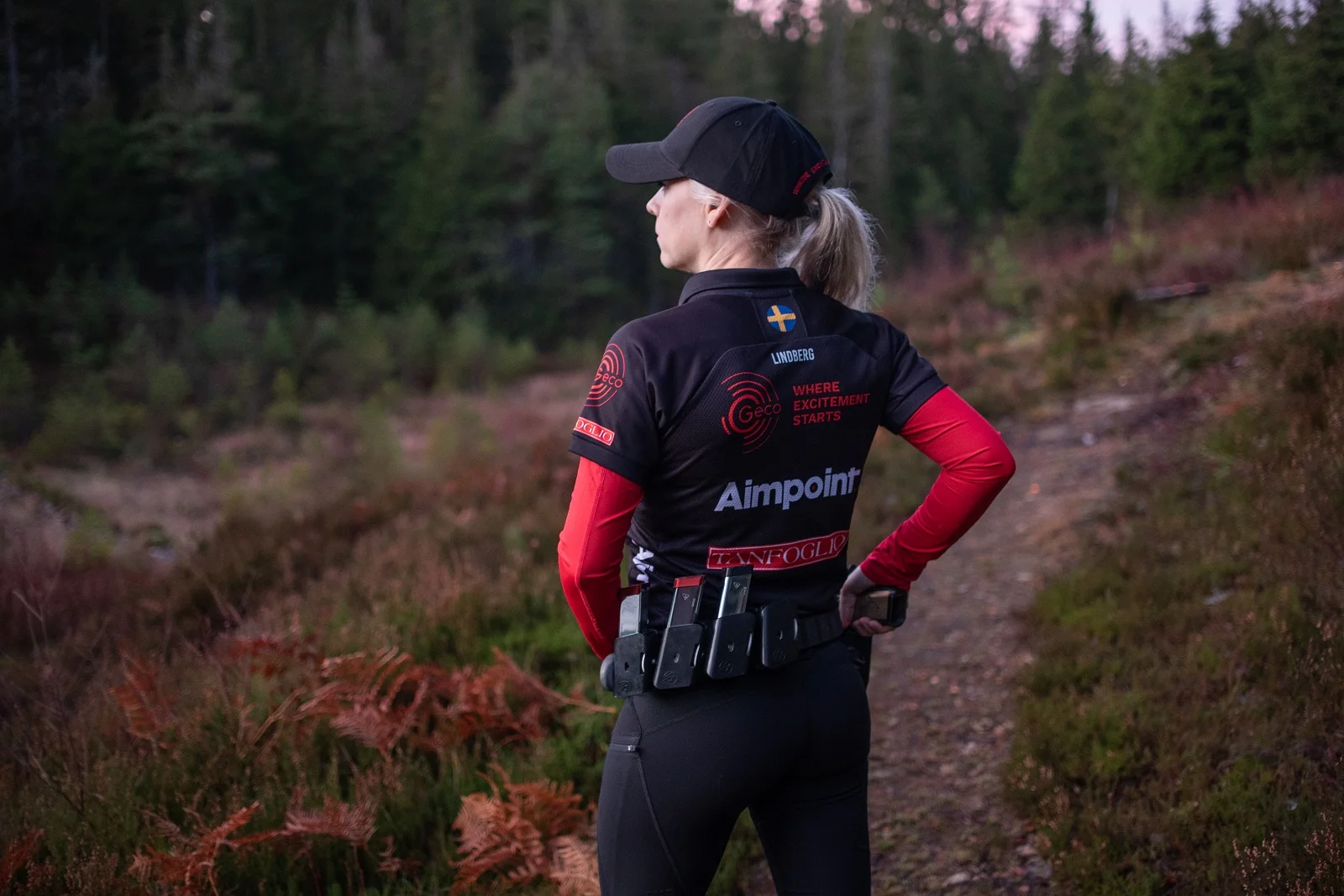
Powered by an Excellent Setup – Tanfoglio Stock 2 Extreme, Aimpoint Acro C-2, Geco Ammo
For practice, I use GECO 9mm Luger 124-grain FMJ ammunition.
For competitions, I use hand-loaded ammunition. I’m now testing a new combination: a 124-grain FMJ RN bullet and case from GECO, Vihtavuori N310 powder, and a Federal 100 small pistol primer.
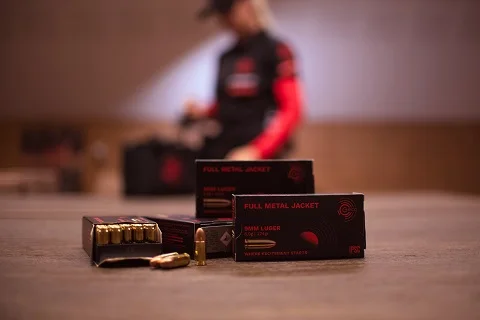
“It's totally normal to feel like you can't learn everything at once. It's always a good idea to start with safety, and then you can build everything else from there."
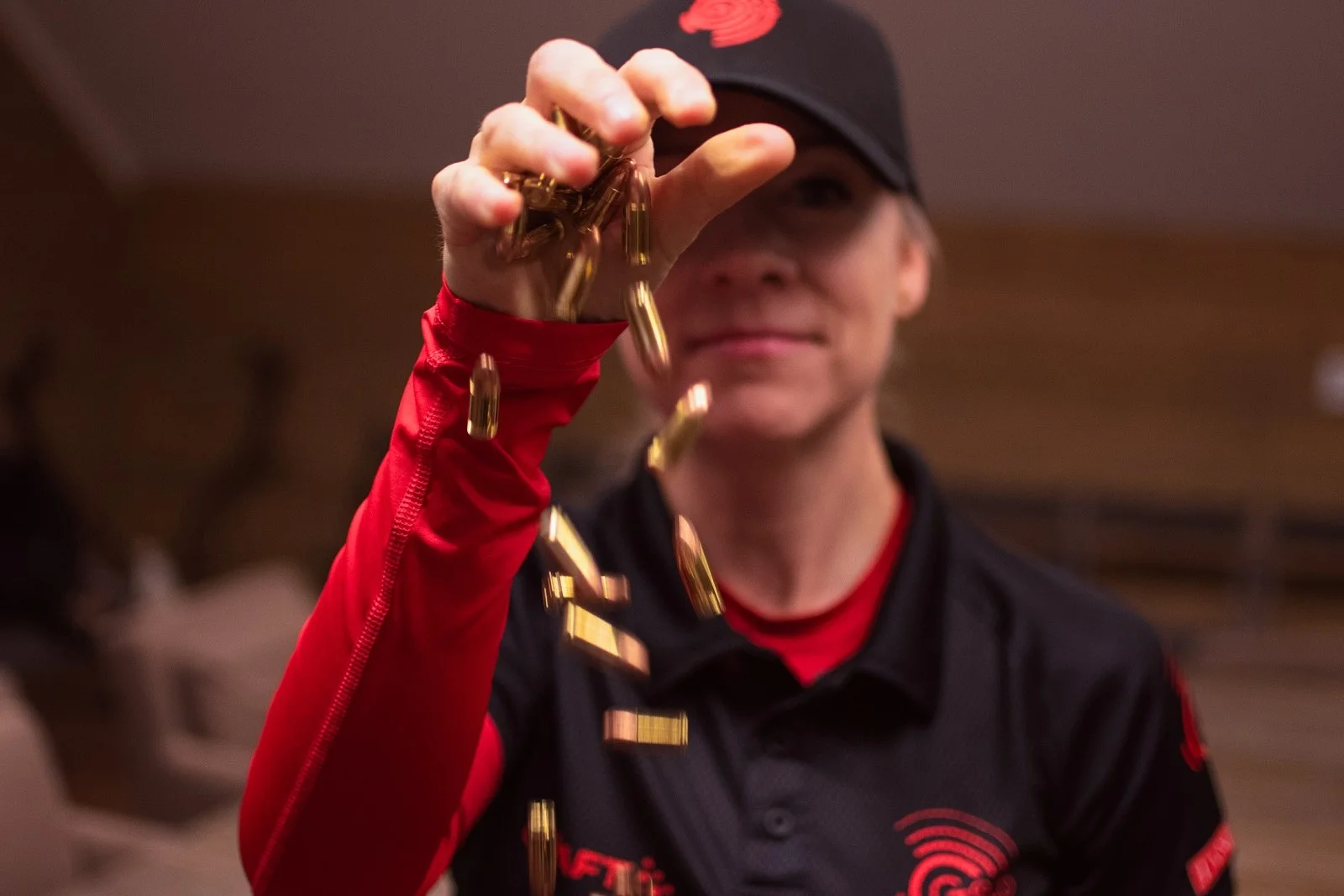
QUICK-FIRE INTERVIEW WITH CECILIA LINDBERG
HOW DO YOU PREPARE DURING THE OFF-SEASON?
What do you look for in dry fire training and what areas do you work on? How much time per week do you spend on dry-fire training (weapon handling, target acquisition, changing body positions, different shooting positions, etc.)?
I have to admit that I rarely do dry-fire training, which I really should do more of! I feel really lucky that I get to practise almost everything live! I do make sure, though, that I practise specific physical movements or starting conditions dry at home or in the safety area before executing a stage during a match.
Do you do any physical work? If so, what kind? (Endurance or cardio, strength endurance, maximum strength, speed, agility, coordination exercises, core stabilization, etc.)
I absolutely love training physically at least four days a week! I love doing cardio, like using the cross-trainer and running! Running is a big part of my routine because I can do it together with our gorgeous dog! I also like to mix in some gym sessions and coordination training, which I find really helps with foot speed. Sometimes I also work on my grip strength, which I find really helps! I also get regular massages from an amazing masseur who really knows how to work on my body.
What about mental training? What methods do you find most helpful? (Visualization techniques, breathing exercises, etc.)
A few years ago, I didn't do so well at a European Championship. I decided to train so much that even if I got nervous, I'd still have a good baseline for the next World Championship. Sadly, my strategy didn't work at all and my performance got worse. This made me think about either quitting competitions or hiring a mental coach. I decided to go for it and have been working with a mental coach for several years now. I've changed coaches once, but eventually went back to my original one as the new one just wasn't right for me. I'm so happy to say that my mental approach is so different now compared to when I started! As I gain new experiences and knowledge, my challenges evolve with me. I've been working on some things since the beginning, and I still find them really helpful. These include things like getting ready mentally (both long- and short-term), spotting and dealing with stress, and staying focused when you're doing something. I've found that visualisation and having a strong mental state really work well for me! I also make sure I have time for meditation, which helps me to calm down quickly, relax and train my focus.
WHAT INVENTORY CHANGES ARE PLANNED AND WHEN?
Changes to the gun or sights?
Oh, I'm absolutely thrilled with the equipment I use!
Are there straps or other equipment you would like to change/improve?
No.
What is your favourite piece of equipment and why?
It's so hard to choose! I especially love the feeling when everything works perfectly together. I just love it when all the individual components of my equipment come together to create a setup that fits me perfectly! If I had to choose just one thing, it would be my pistol. I just love the feeling of how it works in my hands!
Besides guns, straps, or the obvious, what equipment do you think every IPSC shooter should have?
These are great shooting glasses. They should protect your eyes while also being high-quality, so you can see clearly. After a long day on the range, your eyes get tired, so it's important to have glasses that let your eyes relax. It's also important that your glasses work well in different lighting and are right for the type of shooting you do.
HOW DO YOU OBTAIN AND TEST YOUR AMMUNITION?
If you load your own ammunition, which components are most important to you? Factor, performance/accuracy, recoil?
For me, precision is the most important thing, along with making sure the ammunition works well in my pistol.
How much ammunition do you use per year for each firearm?
In a championship year, I try to shoot between 30,000 and 40,000 rounds a year. I use two pistols for training, which handle most of the rounds, and one dedicated pistol for competitions.
Are you separating training ammunition and special competition ammunition, or do you use one type for everything?
I use factory-loaded GECO ammunition for training and some competitions. I also use my own-loaded ammunition for certain competitions.
SEASON PLANNING
How many matches do you shoot in a normal year?
I absolutely love shooting around six Level 3 matches and a few smaller competitions during a regular season! In a championship year, I get to participate in about ten Level 3 matches before the championship, which is just incredible. Overall, I prefer staying home to train rather than attending too many competitions, as I feel more motivated and excited if I keep the number of matches somewhat limited.
How many international trips have you planned for the coming year?
I've planned about six or seven amazing trips!
What is your main competition for the coming year?
The World Shoot is coming to South Africa!
How will you prepare for the main competition? Will there be any rest periods, test competitions, or other special phases?
I'll be training in shooting, mental preparation, and physical fitness throughout the entire period leading up to the match. At certain times, I'll intensify specific areas. Close to the match, I'll focus more on shooting and mental training, letting physical training take a back seat to conserve energy. I'm someone who likes to feel in control, so I've already started practical preparations for the trip – I'm so excited!
SUCCESSES AND DEFEATS
What is your motivation to participate in the IPSC sport, or what is the special attraction?
You can always improve, and that's a wonderful thing! You can always become faster and more accurate, and I'm here to help you do just that! There's also something really lovely about constantly facing new challenges. And then there's that amazing feeling of euphoria when you've nailed a stage – it's totally unmatched and hard to beat!
What was your most successful/pleasurable competition (last season) and why?
The European Handgun Championship (EHC) in Greece. I had a plan before the match regarding the level I wanted to shoot at, and I'm happy to say that everything went almost exactly according to plan! I even managed to have some fun on the range, which was a real bonus.
What was your worst competition and why?
The World Shoot in Thailand 2022 was a bit of a disaster for me. I developed some pretty bad stomach issues as soon as I arrived in Thailand, and they just got worse and worse throughout the match. One of my strongest attributes as a shooter – my ability to move quickly – was completely taken away. I just couldn't handle it mentally and wasn't able to make the best of the situation, which resulted in a poor performance.
PARTICIPATION IN A COMPETITION
What is your focus during the walkthrough?
Keeping an eye on the number of targets and rounds, and deciding where to reload. Then I decide how to shoot specific targets. I also make sure I'm in the right position.
How do you deal with being the first shooter in the first stage?
I take a few deep breaths and focus on the task at hand. I quickly decide on a solution and stick to it. Even if it's not the best plan, it's better to give it your best shot than to be unsure of what to do.
How long before the first competition shot do you arrive at the shooting range?
At least 40 minutes.
What diet do you follow or how do you keep fit during a competition?
I tend to get a bit of a stomach ache when I'm stressed, but I've found a few things that help. I tend to steer clear of white flour because it doesn't agree with my stomach. During a match, I don't usually eat a big meal; instead, I snack throughout the day. I also make sure I eat and drink plenty of protein because my body functions well with it. I also make sure to pack my magnesium supplements when I'm travelling.
Do you have a formula/basic attitude for approaching a competition? (Do you focus on speed or hits; do you occasionally push your own limits/step out of your comfort zone or take deliberate risks; do you prefer to be in a team with 'better shooters' or vice versa etc.?)
It really depends on the type of match. I tend to play it safer during championships. If I'm developing something in particular during training, I'll test it out in a match when there's some pressure involved. I much prefer to be in a team with better shooters if they're good people to work with. If they're not, it can have the opposite effect. Overall, I need to be more willing to take risks during matches.
Which stage elements/designs do you like best, and which ones not so much? (Long courses, short courses, moving targets, memory stages, field courses with lots of running, stages that require good accuracy, spray and pray stages, etc.)
I tend to enjoy stages that involve a lot of running. I also like stages that require a bit of precision. I don't enjoy "spray and pray" stages much because I don't find them fun and I'm not particularly good at them. I'm not a big fan of memory stages either, especially if they're designed with narrow shooting ports in a straight line and hard-to-distinguish targets.
What wisdom would you give to an IPSC novice or anyone interested in the sport on his or her first day?
It's totally normal to feel like you can't learn everything at once. It's always a good idea to start with safety, and then you can build everything else from there. It takes time to become a good IPSC shooter.

